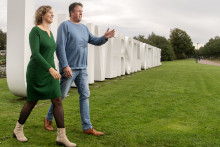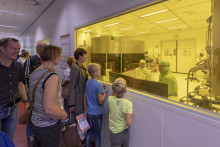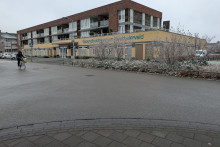One of these projects is a study on loneliness among Twente citizens. Jeroen Ottink, project leader of the IKKanWelzijn Enschede foundation, immediately addresses a common preconception. ‘Loneliness can affect anyone and everyone. It can’t be linked to factors such as age or background. The most important factors are life-changing events and circumstances such as: dismissal, a death, a new degree programme, retirement, poverty and low literacy. The trigger often has to do with major changes in your life’s trajectory,’ he explains.
Together with UT researcher Jodi Sturge, he is working on establishing the subsidised project. And that is very much needed, he says. ‘Research shows that fifty percent of Enschede’s residents experience feelings of loneliness. That’s a high figure! And we know that twelve to thirteen per cent even have feelings of extreme loneliness. This undoubtedly leads to psychological and mental issues. We know from previous research that loneliness is as harmful as smoking fifteen cigarettes a day.’
'Citizen Science is a broad movement' - Michelle de Boer
Previous research has shown that people need positive encounters, Ottink points out. ‘How can we facilitate this and bring it about? That’s what we will be exploring together with the UT. There are welfare organisations that often focus strongly on offering activities. These activities are informally advertised as: ‘Come and eat with us!’ Or ‘Join us for a bike ride’. But this is not how you reach the people who are truly lonely. The real question is: how do we get behind the front doors of people who are lonely. That’s where our focus lies.’
No ivory tower
The study is still in its early stages. It currently involves a group of fifteen to twenty people who have recently experienced feelings of loneliness. Research questions are formulated collectively based on their experiences. In addition, the initiators are engaging in discussions with UT researchers, and seek support from students if possible. ‘The aim is that in due course we’ll be able to present joint results, substantiated by data. Results that answer questions like: What actions or what products are needed to help people maintain valuable contacts? That’s the first step. After that, we will consider our next steps,’ Ottink explains.
Broader movement
Michelle de Boer, coordinator of Citizen Science Hub Twente, calls citizen research the ‘democratisation of science.’ ‘Citizen Science is a broad movement, she points out. ‘We shouldn’t pretend it’s something new. Citizens have had an active role in various research projects at the University of Twente for a long time. I’m referring to projects at the ITC and BMS faculties. Think, for example, of soil measurements carried out by local inhabitants.’
‘In January 2023, we officially launched Citizen Science Hub Twente,’ says De Boer. ‘The aim of this hub is to coordinate and support citizen science activities within the UT.’ The hub builds on TOPFIT CitizenLab, the European INCENTIVE project that is setting up four Citizen Science Hubs at four European universities including the UT, and is in line with UT’s Shaping 2030 strategy.
Participating in research
A prime example of citizen participation is the page on the University of Twente website where citizens can sign up to participate in research on the online platform ‘Meedoen’, De Boer points out. ‘This portal works both ways: not only can residents express their interest in participating in ongoing research, but citizens can also pose their own research question here. For example, one resident asked whether the UT could do research on the valuable conversion of car exhaust gases. This way, the portal also provides the UT with insight into what citizens are interested in.’
To her great satisfaction, Michelle de Boer has noticed that more and more is happening at the UT in terms of Citizen Science. As an example, she mentions the recent Citizen Science for Health conference, which involved a special day for citizens. ‘That day, citizens got to work with researchers on citizen science methodologies.’ She also sees the recent appointment of community manager Wiro Kuipers as a valuable stimulus. ‘Our Citizen Science Hub is also there to support researchers and citizens and to keep those people engaged. Wiro will certainly have a valuable role to play in this.’
'That people really become less lonely. That would be a true victory' - Jeroen Ottink
The five projects subsidised by the UT and the Province of Overijssel are now up and running. ‘We don't have an ultimate goal for the study on loneliness among Twente citizens,’ says De Boer. ‘But if we manage to connect the people currently participating as trainers in this project to citizen science after it’s completed, that would be wonderful! They in turn might be able to train others on the topic of loneliness. This creates a ripple effect.’
The initiated citizen project is also a pilot for the UT. De Boer: ‘We’re learning from it as a university. Every quarter, we review the progress and discuss what problems we have encountered. It’s a valuable learning process.’ But what is even more important is that this project ultimately yields results that benefit citizens. ‘That people really become less lonely. That would be a true victory,’ says Ottink.






